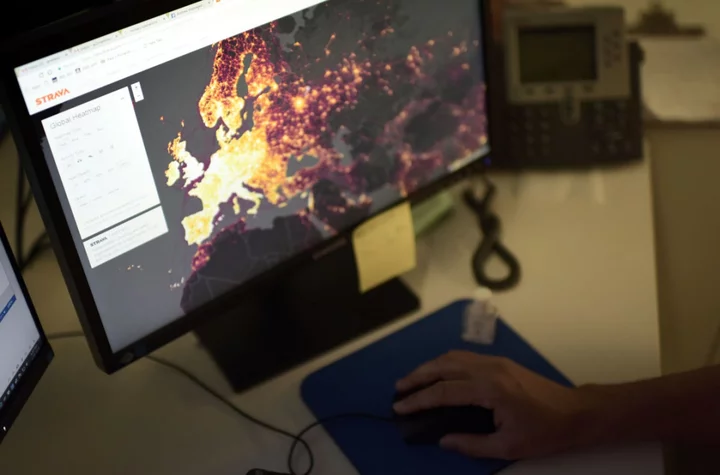
Thousands flock to ‘AI Jesus’ for gaming, relationship advice
A chatbot designed to resemble an ‘AI Jesus’ has attracted hundreds of Twitch users seeking gaming and relationship advice. The device, created by a Berlin tech collective, shows a bearded white man with a bright white halo who gestures as he answers questions having been “trained after Jesus and the teachings of the Bible.” Its “ask_jesus” livestream attracted over 35,000 followers and allowed viewers to ask questions. It was created by The Singularity Group, a non-profit which said the Twitch stream cost it €322 (£276) per day for the chatbot ‘voice’ and €38 (£33) a day for the GPT4 model behind the boot. Asked to share views on topics such as abortion and gay rights, AI Jesus was found to provide vague, non-partisan replies, such as advising the user to look at the issues from legal and ethical perspectives. “Whether you’re seeking spiritual guidance, looking for a friend, or simply want someone to talk to, you can join on the journey through life and discover the power of faith, hope, and love,” said the bio for the “ask_jesus” Twitch page. Twitch has, however, taken down the channel and it remains to be seen on what grounds the decision was made by the streaming platform. The disclaimer on the page said the channel “is currently unavailable due to a violation of Twitch’s Community Guidelines or Terms of Service”. This is not the first time an AI chatbot was developed for users to interact with over topics of religion. Many AI chatbots based on the Hindu scripture Bhagavad Gita have emerged in India, with millions of using it. One such chatbot, GitaGPT, replies to user queries based on the 700-verse Hindu scripture, mimicking Hindu god Krishna’s tone. It claims to help users “unlock life’s mysteries with Krishna”. “You’re not actually talking to Krishna. You’re talking to a bot that’s pretending to be him,” said the bot’s creator Sukuru Sai Vineet, a software engineer from Bengaluru. However, journalist Nadia Nooreyezdan, who interacted with GitaGPT, found it lacked filters for casteism, misogyny and law, with experts cautioning that AI systems playing ‘god’ can have dangerous and unintended consequences. When The Independent asked GitaGPT about Narendra Modi – whose political party BJP has close links to right-wing Hindu nationalist group RSS – it had only words of praise for the Indian prime minister, calling him a “great leader” who is “honest” and “hardworking” with a “vision for the country”. On his political rival Rahul Gandhi, the chatbot said he was a “good person” who is “sincere and hardworking”, but also stated that he could “however, benefit from studying the Bhagavad Gita and learning about dharma [duty]”. Read More Hundreds attend ‘soulless’ AI-generated church service OpenAI CEO suggests international agency like UN's nuclear watchdog could oversee AI AI chatbot taken down after it gives ‘harmful advice’ to those with eating disorders Google ad revenue from anti-abortion campaigns and ‘fake’ clinics topped $10m: report Major finding boosts hope for finding alien life in our solar system Twitter to be evicted from Colorado office
1970-01-01 08:00

UFO expert claims that the south pole is a 'air traffic control' for aliens
You may have been hearing a lot about UFOs lately, and that’s largely thanks to Ufologist Dr. Steven Greer who has been hosting a conference on the subject. A range of people were invited to share their insights as part of an event streamed online and it saw Eric Hecker describe the south pole as an “air traffic control” hub for aliens. The conspiracy theorist made some pretty out-there claims at the conference, but it’s the discussion about the Amundsen–Scott South Pole Station that was most significant. Hecker claimed that in 2010 Raytheon, the US aerospace and defence conglomerate chose him to be a contractor on the research centre operated by the United States National Science Foundation. Sign up to our free Indy100 weekly newsletter There was “much more” to the station that first met the eye, according to Hecker. Monday, June 12, 2023! Dr. Greer's Groundbreaking National Press Club Event! FREE to Watch! www.youtube.com He claimed the station actually operated as an “air traffic control” centre for UFOs and communicated with “exotic” crafts by sending neutrino rays up into space. Hecker went further by talking about “digital optical modules” buried a mile beneath the surface under the ice. He claims they were buried in order to detect neutrino interactions while being deep enough not to interfere with radiation readings. He also said he personally saw a “powerful green laser” pointing “at the cosmos.” It comes after a whistleblower who claims that the US government has been operating UFO retrieval research in secret has reportedly said that UFOs have been responsible for the deaths of humans. David Grusch worked for the National Geospatial-Intelligence Agency (NGA) and the National Reconnaissance Office (NRO) and was involved with the Unidentified Aerial Phenomena Task Force. He claimed that some of the “non-human intelligences” discovered have malevolent intentions and have killed people. Have your say in our news democracy. Click the upvote icon at the top of the page to help raise this article through the indy100 rankings.
1970-01-01 08:00

Why thousands of dead fish mysteriously washed up on a beach in the US
Thousands of dead fish have mysteriously washed up on the Texas coast as a result of 'low-dissolved oxygen' in the water. According to Texas Parks & Wildlife, low oxygen levels are common in the summer when temperatures rise, making it so the fish can't 'breathe'. However, the footage looks like something out of a horror movie, with piles of silver carcasses lining the sand, 65 miles south of Houston. Most of the fish are thought to be Gulf menhaden, which are often used for bait. Sign up to our new free Indy100 weekly newsletter
1970-01-01 08:00

TikTok to invest billions of dollars in Southeast Asia amid growing scrutiny over data security
Short video app TikTok, owned by China's ByteDance, said on Thursday it would invest billions of dollars in Southeast Asia over the next few years, as it doubles down on the region amid intensifying global scrutiny over its data security.
1970-01-01 08:00

Siemens to invest $2.2 billion to ramp up global production
By John Revill ZURICH (Reuters) -Siemens will spend 2 billion euros ($2.16 billion) on a new global investment plan, the
1970-01-01 08:00

Bain Capital Offers to Buy SoftwareOne for $3.2 Billion
Bain Capital made an non-binding all-cash offer for SoftwareOne Holding AG for 2.93 billion Swiss francs ($3.2 billion)
1970-01-01 08:00

TikTok CEO says to invest billions of dollars in Southeast Asia
JAKARTA Short video app TikTok plans to invest billions of dollars in Southeast Asia over the next few
1970-01-01 08:00

Twitter to be evicted from Colorado office over unpaid rent
Elon Musk’s Twitter is set to be evicted from their office in Colorado after the social media platform failed to pay its rent, according to reports. A judge signed an order on 31 May giving law enforcement 49 days to kick Twitter out of the office at 3401 Bluff Street in Boulder, Colorado, reported The Denver Post. The company once had 300 employees at the 65,000sq-ft office, but it is unknown if anyone even still works there after sweeping job cuts made by the billionaire after he bought the company last October. Last year, Twitter fired 87 employees at the Boulder, with another 38 voluntarily resigning, according to a November notice to the Colorado Department of Labor and Employment. Twitter’s landlords filed a complaint for unpaid rent against the company on 12 May, with court papers stating that the platform leased four units in the building in February 2020. The landlord stated that a default notice to Twitter was ignored and they instead used a letter of credit deposited by Twitter as security for the offices to pay $968,000 in rent, the newspaper reported. The landlord then asked Twitter to replenish the security deposit but says that the company ignored the request. The platform was also sued last month by Boulder’s Avalanche Commercial Cleaning for around $93,500 for unpaid bills. A request for comment from The Independent received an auto-reply with a poop emoji from Twitter. Read More Elon Musk to launch biggest ever rocket after dramatic failure Elon Musk eyes ‘highly habitable’ planet that’s ‘practically next door’ Jack Dorsey says Indian government threatened to ‘shut Twitter down’ and raid staff homes Elon Musk is hilariously shut down by his ‘favourite’ podcast Elon Musk appears to side with Republican shamed for criticising Megan Fox’s parenting
1970-01-01 08:00

Music Companies Sue Twitter for Alleged Copyright Violations
The National Music Publishers’ Association sued Twitter Inc. Wednesday, alleging it violates the copyright of songwriters by using
1970-01-01 08:00

Microsoft, Activision ask judge for speedy schedule in FTC challenge
WASHINGTON Microsoft and Activision Blizzard asked a U.S. judge on Wednesday to quickly schedule a case management conference
1970-01-01 08:00

Flipkart and PhonePe could be $100 billion businesses in India, Walmart says
By Siddharth Cavale NEW YORK Walmart's Flipkart marketplace and PhonePe payments business in India could be $100 billion
1970-01-01 08:00

Strava responds to alarming report suggesting that it could be used to track down users
A new report claims that Strava could be used to track people down – despite the platform’s efforts to make their data anonymous. Strava is a fitness tracking platform that allows people to log their exercises as well as engage with other based on their workouts. But it also includes other tools, such as its heatmap feature, which is intended to anonymously gather together people’s journeys and show them on one map. The tool is intended to allow people to see which parts of the world are particularly active, which can be helpful for finding particularly good areas for workouts or trips. But it can also be used to find out people’s personal information, according to a new report. That heatmap data is anonymised, so that it shows more general trends and cannot be used to track specific people who might mark their routes private. But the new research suggests that it is possible to de-anonymise that data, at least in some cases, to work out who lives where. The paper, published by three computer science researchers at North Carolina State University, says that “the home address of highly active users in remote areas can be identified, violating Strava’s privacy claims and posing as a threat to user privacy”. They detailed a complicated process that they claimed was able to find addresses and then combine that with other data from Strava to find the home address of a certain individual. In short, they were able to use the heat map to identify locations where people lived, and then take other location data to work out who might live at that specific house. The attack will not work on everyone: they need to live in remote areas where people’s houses stand on their own, those users need to have the heat map setting switched on, and might run in patterns that do not identify their home addresses, for instance. But the researchers claimed that a significant number of users could be identified based on publicly available information on Strava. That is a “violation of user privacy”, the researchers said. And it could also pose a threat to those users, by allowing people’s addresses to be made public, and then matched to certain activities, such as when they work out or where they tend to travel. The researchers suggested two ways to avoid the attack. One would be to remove heat map data that is clearly near a home, and another would be to add Strava’s existing “privacy zones” tools that block out data from certain locations to its heat map, which is not currently the case. Strava said that it looks to ensure users’ data stays private, and suggested that people concerned about potential issues turn off the use of aggregated user data on their account. “The safety and privacy of our community is our highest priority. We’ve long had a suite of privacy controls (including Map Visibility Controls) that give users control over what they share and who it’s shared with,” the company said. “Strava does not track users or share data without their permission. When users share their aggregated, de-identified data with the Heatmap and Strava Metro, they contribute to a one-of-a-kind data set that helps urban planners as they develop better infrastructure for people on foot and bikes, and makes it easy to plan routes with the knowledge of the community. “The Global Heatmap displays aggregated data from a subset of Strava activities and will not show ‘heat’ unless multiple people have completed an activity in a given area. Any Strava user who does not wish to contribute to the Heatmap can toggle off the Aggregated Data Usage control to exclude all activities or default their Activity Visibility to be only to themselves (’Only You’) for any given activity. “We are consistently strengthening privacy tools and offering more feature education to give users control over their experience on Strava. This includes simplifying our Privacy Policy with our Privacy Label at the top.” Read More Breakthrough could soon allow us to actually use quantum computers, scientists say Three and Vodafone are merging. Here’s what that means for your phone McDonald’s, Delta among websites down after Amazon Web Services cloud crashes Breakthrough could soon allow us to actually use quantum computers, scientists say Three and Vodafone are merging. Here’s what that means for your phone McDonald’s, Delta among websites down after Amazon Web Services cloud crashes
1970-01-01 08:00
